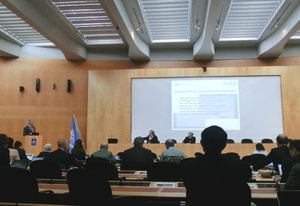GEO 2016 Work Programme Symposium was held from 2 to 4 May 2016 in Geneva, Switzerland. Group on Earth Observation (GEO) is an international framework which was established in 2005 based on intergovernmental consensus of the Earth Observation Summit I-III and consists of more than 100 nations, 90 international organizations and European Commission. Since voluntary activities by the member nations and organizations are the substance of the GEO, the symposium brings together GEO members, their observation/data-related institutions and GEO Secretariat to discuss on various themes ranging from implementation of the tasks of the work programme to the governance of GEO.
GEO’s primal objective is to contribute to rational decision-making for addressing global issues such as climate change by providing reliable data and information on the earth to policy-makers and stakeholders through creating an integrated network for earth observations and data-sharing named “GEOSS”, thus, GEO organically works for realizing GEOSS in cooperation with various international bodies including WMO, WCRP, GCW, GCOS, SAON*. Along with the growing awareness of the Arctic changes, GEO has accelerated to make cooperation with and among domestic and international efforts in observation and data dissemination in the cold regions including the Arctic, and as a result, GEO Cold Region Initiative (GEOCRI) was developed in 2016. During the symposium, GEOCRI meeting took place to improve its three-year implementation plan for 2017-2019 and GEOCRI participants including China, US, Finland, Norway, Japan and GCW had a discussion to shape the plan. GEOCRI will start its activities from 2017 and further input and involvement from cryosphere-related and polar-related communities throughout the world are being called for to crystallize the implementation plan.
In the Arctic Observing Summit 2016 held in Fairbanks, Barbara Ryan, the Secretariat Director of GEO, emphasized that GEO will continuously work on promoting the efforts for coordinated and sustained observation and data-sharing in the Arctic including YOPP and strengthening partnerships with them through GEOCRI and GEO’s brokering function. The Arctic Data archive System (ADS) developed by NiPR has made linkage with the GEOSS-Portal developed by GEO and started to provide meta-data of observations conducted by Japanese institutions in the Arctic. Linkage with international frameworks such as GEO will leads to increase in accessibility and discoverability of the Japanese efforts in the Arctic by researchers, policy-makers, private-sectors and stakeholders throughout the world, and consequently to rational decision-making for addressing global issues.
Akiko Yamada(JAMSTEC)
*WMO(World Meteorological Organization)
WCRP(World Climate Research Programme)
GCW(Global Cryosphere Watch)
GCOS(Global Climate Observing System)
SAON(Sustaining Arctic Observing Networks)





